

How Buddhism Benefits Mental Health. Buddhism and Politics - Buddhism - Oxford Bibliographies. There are at least three separate issues that scholars investigate under the title “Buddhism and politics”: (1) the normative political content of Buddhist texts and practices, as discussed in Moore 2016; (2) the historical interaction of Buddhist teachers and communities with various political authorities and forces, as explored in Harris 2007; and (3) the contemporary political activity of Buddhists, as explained in Friedlander 2009.

Gard 1952, Gard 1956, and Gard 1962 are essential sources for identifying primary texts relevant to politics. Pardue 1971 provides a broad overview of how Buddhism has affected politics in Asia, while Bechert 1973 focuses on changes in Buddhist ideas about politics beginning in the 19th century. Myint 2015 focuses on the political ramifications of the “emptiness” doctrine. HuffPost is now a part of Verizon Media. HuffPost is part of Verizon Media.

We and our partners will store and/or access information on your device through the use of cookies and similar technologies, to display personalised ads and content, for ad and content measurement, audience insights and product development. Your personal data that may be used Information about your device and internet connection, including your IP address Browsing and search activity while using Verizon Media websites and apps Precise location Find out more about how we use your information in our Privacy Policy and Cookie Policy. To enable Verizon Media and our partners to process your personal data select 'I agree', or select 'Manage settings' for more information and to manage your choices.
Buddhists - Religion in America: U.S. Religious Data, Demographics and Statistics. Pew Research Center. There are about 488 million Buddhists worldwide, representing 7% of the world’s total population as of 2010.
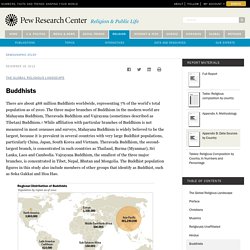
List of Buddhist Celebrities. 5 facts about Buddhists around the world. Buddhists across Asia are preparing to celebrate the birthday of Prince Siddhartha Gautama, who later became known as Gautama Buddha and was the founder of Buddhism.
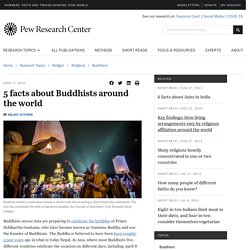
The Buddha is believed to have been born roughly 2,500 years ago in what is today Nepal. In Asia, where most Buddhists live, different countries celebrate the occasion on different days, including April 8 in Japan, May 12 in South Korea and May 18 in India and Nepal. The holiday goes by several names, including Buddha Purnima, Vesak, Buddha Jayanti and Ikh Duichen, and is often marked by national holidays, festivals and events at Buddhist temples. Here are five facts about Buddhists: Buddhists made up roughly 7% of the world’s population in 2015, but they are expected to decrease to roughly 5% by 2060. 2Half the world’s Buddhists live in China, according to 2010 Pew Research Center estimates. Ten misconceptions about Buddhism. Robert E.
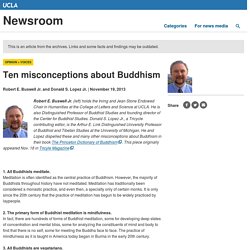
Buswell Jr. and Donald S. Lopez Jr. | November 19, 2013 Robert E. Buswell Jr. (left) holds the Irving and Jean Stone Endowed Chair in Humanities at the College of Letters and Science at UCLA. The Origins of Buddhism. Buddhism, founded in the late 6th century B.C.E. by Siddhartha Gautama (the "Buddha"), is an important religion in most of the countries of Asia.
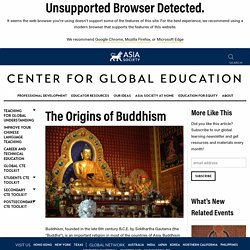
Buddhism has assumed many different forms, but in each case there has been an attempt to draw from the life experiences of the Buddha, his teachings, and the "spirit" or "essence" of histeachings (called dhamma or dharma) as models for the religious life. However, not until the writing of the Buddha Charita (life of the Buddha) by Ashvaghosa in the 1st or 2nd century C.E. do we have acomprehensive account of his life. The Buddha was born (ca. 563 B.C.E.) in a place called Lumbini near the Himalayan foothills, and he began teaching around Benares (at Sarnath).
His erain general was one of spiritual, intellectual, and social ferment. This was the age when the Hindu ideal of renunciation of family and socia llife by holy persons seeking Truth first became widespread, and when the Upanishads were written. Author: Lise F. Buddhism - Definition, Founder & Origins. Buddhism is a faith that was founded by Siddhartha Gautama (“the Buddha”) more than 2,500 years ago in India.
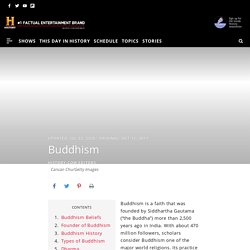
With about 470 million followers, scholars consider Buddhism one of the major world religions. Its practice has historically been most prominent in East and Southeast Asia, but its influence is growing in the West. Many Buddhist ideas and philosophies overlap with those of other faiths. Buddhism Beliefs Some key Buddhism beliefs include: Followers of Buddhism don’t acknowledge a supreme god or deity. Founder of Buddhism Siddhartha Gautama, the founder of Buddhism who later became known as “the Buddha,” lived during the 5th century B.C. Gautama was born into a wealthy family as a prince in present-day Nepal.
He decided to give up his lavish lifestyle and endure poverty. After six years of searching, Buddhists believe Gautama found enlightenment while meditating under a Bodhi tree. Buddhism History Over the next few centuries, Buddhism began to spread beyond India.